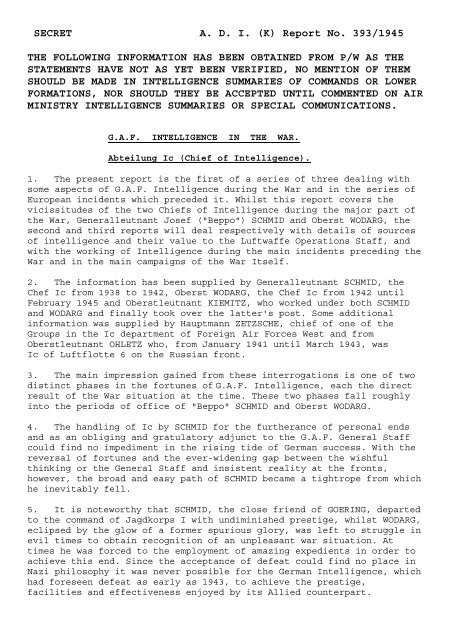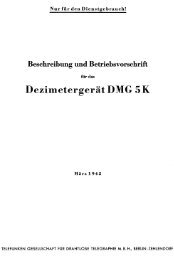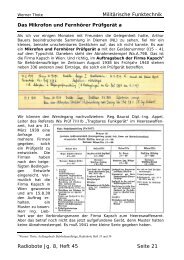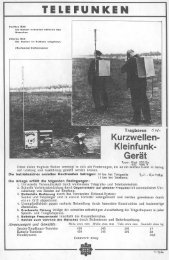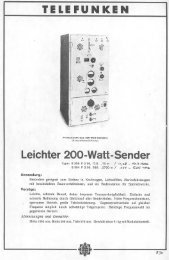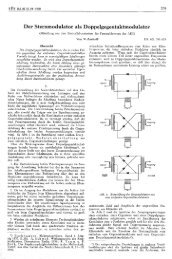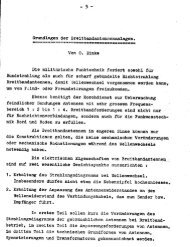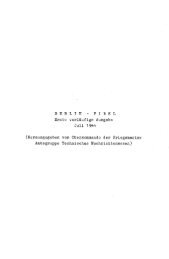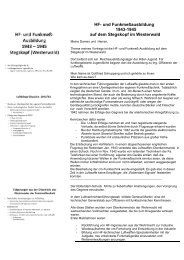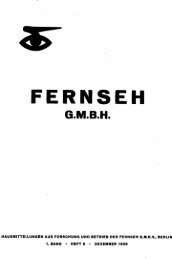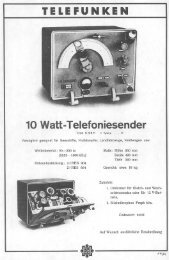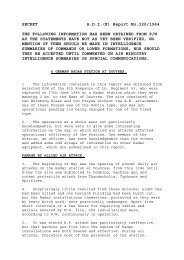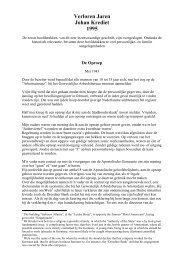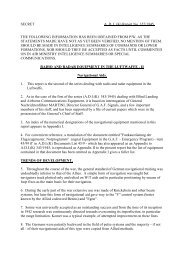SECRET A. D. I. (K) Report No. 393/1945 THE ... - Cdvandt.org
SECRET A. D. I. (K) Report No. 393/1945 THE ... - Cdvandt.org
SECRET A. D. I. (K) Report No. 393/1945 THE ... - Cdvandt.org
Create successful ePaper yourself
Turn your PDF publications into a flip-book with our unique Google optimized e-Paper software.
<strong>SECRET</strong> A. D. I. (K) <strong>Report</strong> <strong>No</strong>. <strong>393</strong>/<strong>1945</strong><br />
<strong>THE</strong> FOLLOWING INFORMATION HAS BEEN OBTAINED FROM P/W AS <strong>THE</strong><br />
STATEMENTS HAVE NOT AS YET BEEN VERIFIED, NO MENTION OF <strong>THE</strong>M<br />
SHOULD BE MADE IN INTELLIGENCE SUMMARIES OF COMMANDS OR LOWER<br />
FORMATIONS, NOR SHOULD <strong>THE</strong>Y BE ACCEPTED UNTIL COMMENTED ON AIR<br />
MINISTRY INTELLIGENCE SUMMARIES OR SPECIAL COMMUNICATIONS.<br />
G.A.F. INTELLIGENCE IN <strong>THE</strong> WAR.<br />
Abteilung Ic (Chief of Intelligence).<br />
1. The present report is the first of a series of three dealing with<br />
some aspects of G.A.F. Intelligence during the War and in the series of<br />
European incidents which preceded it. Whilst this report covers the<br />
vicissitudes of the two Chiefs of Intelligence during the major part of<br />
the War, Generalleutnant Josef ("Beppo") SCHMID and Oberst WODARG, the<br />
second and third reports will deal respectively with details of sources<br />
of intelligence and their value to the Luftwaffe Operations Staff, and<br />
with the working of Intelligence during the main incidents preceding the<br />
War and in the main campaigns of the War Itself.<br />
2. The information has been supplied by Generalleutnant SCHMID, the<br />
Chef Ic from 1938 to 1942, Oberst WODARG, the Chef Ic from 1942 until<br />
February <strong>1945</strong> and Oberstleutnant KIEMITZ, who worked under both SCHMID<br />
and WODARG and finally took over the latter's post. Some additional<br />
information was supplied by Hauptmann ZETZSCHE, chief of one of the<br />
Groups in the Ic department of Foreign Air Forces West and from<br />
Oberstleutnant OHLETZ who, from January 1941 until March 1943, was<br />
Ic of Luftflotte 6 on the Russian front.<br />
3. The main impression gained from these interrogations is one of two<br />
distinct phases in the fortunes of G.A.F. Intelligence, each the direct<br />
result of the War situation at the time. These two phases fall roughly<br />
into the periods of office of "Beppo" SCHMID and Oberst WODARG.<br />
4. The handling of Ic by SCHMID for the furtherance of personal ends<br />
and as an obliging and gratulatory adjunct to the G.A.F. General Staff<br />
could find no impediment in the rising tide of German success. With the<br />
reversal of fortunes and the ever-widening gap between the wishful<br />
thinking or the General Staff and insistent reality at the fronts,<br />
however, the broad and easy path of SCHMID became a tightrope from which<br />
he inevitably fell.<br />
5. It is noteworthy that SCHMID, the close friend of GOERING, departed<br />
to the command of Jagdkorps I with undiminished prestige, whilst WODARG,<br />
eclipsed by the glow of a former spurious glory, was left to struggle in<br />
evil times to obtain recognition of an unpleasant war situation. At<br />
times he was forced to the employment of amazing expedients in order to<br />
achieve this end. Since the acceptance of defeat could find no place in<br />
Nazi philosophy it was never possible for the German Intelligence, which<br />
had foreseen defeat as early as 1943, to achieve the prestige,<br />
facilities and effectiveness enjoyed by its Allied counterpart.
<strong>THE</strong> FIRST CHEF IC - 1938 to 1942.<br />
6. The 5th Abteilung was established as part of the G.A.F. General<br />
Staff on first January 1938 and was to collect information on foreign<br />
air forces and to build up target data for appreciation in air warfare.<br />
The new department was to combine and systematise functions previously<br />
the responsibility of a target data unit and of R.L.M. departments of<br />
foreign air forces.<br />
7. Those two <strong>org</strong>anisations were already known respectively as Gruppe<br />
II of the first Abteilung and the 5th Abteilung, and were manned by<br />
civilians and reserve officers who had large quantities of information<br />
from the foreign press and literature at their disposal, but worked with<br />
no clearly defined aims; their main policy seemed to be deliberate<br />
exaggeration of the strength of foreign countries it order to justify<br />
German armament.<br />
8. An appreciation by Generalleutnant SCHMID of the achievements of<br />
these two <strong>org</strong>anisations up to January 1938 will be found in Appendix I<br />
to this report.<br />
9. The new 5th Abteilung was to be under the command of<br />
Generalleutnant, - then Major, - SCHMID, who since 1935 had been<br />
employed in a ministerial capacity and had no knowledge of foreign<br />
languages. He had, however, been recommended to GOERING by<br />
Oberstleutnant JESCHONNEK, at that time Chief of the 1st Abteilung of<br />
the General Staff.<br />
10. The first task which SCHMID set himself was to replace his staff by<br />
younger and more suitably qualified officers, although these were<br />
difficult to obtain. The <strong>org</strong>anisation of the 5th Abteilung, or<br />
department Ic of the Ops. Staff as it now became, is shown in Appendix<br />
II to this report. After the dismissal of SCHMID in 1944 the department<br />
was re<strong>org</strong>anised by Oberst WODARG to the form in which it remained until<br />
the closing stages of the war. This aspect is discussed later in this<br />
report and the new <strong>org</strong>anisation appears in Appendix IV.<br />
11. The main departments of SCHMID’s new <strong>org</strong>anisation were set up as a<br />
first echelon at the Wildpark headquarters, and other departments as a<br />
second echelon at the R.L.M. in Berlin. For 2 1 / 2 years SCHMID and his<br />
staff lived and worked in the command train which was the "Robinson"<br />
headquarters.<br />
12. By the outbreak of war intelligence departments had also been set<br />
up in the subordinate commands of the G.A.F., but choice and training of<br />
staffs were far from satisfactory, and it was not until 1942 that Ic<br />
(Intelligence) officers were appointed down to Geschwader and Gruppe<br />
levels. Even then the type of officers chosen reflected a lack of<br />
appreciation of the needs of Intelligence.<br />
13. According to Oberstleutnant OHLETZ, the entire Ic service suffered<br />
from lack of experience when the war broke out, since the apparatus to<br />
meet the demands of war was not brought into being, until that time;<br />
from the technical point of view, however, Intelligence had played its<br />
part well up to that time, as, for instance, in that the target indices
available at the outset were good, as were the political and<br />
geographical studies produced.<br />
14. In spite of SCHMID's efforts to introduce younger men into<br />
Intelligence at the time when he took office, his specialist staff was<br />
still mainly composed of older reserve officers, the majority of whom<br />
were lacking in both physical and mental agility. His officers were<br />
blindly devoted to him and appeared uncritical of the course he gave<br />
them to pursue.<br />
15. Actually there was much disagreement in the G.A.F. concerning the<br />
personality of SCHMID. His self-confidence was enormous and his enmity<br />
was feared. By virtue of his double office as Chef Ic and GOERING’s<br />
personal General Staff Officer, he exerted an influence over GOERING<br />
outweighing even that of JESCHONNEK when the latter was Chief of Staff.<br />
The strong tension later existing between SCHMID and JESCHONNEK was<br />
openly discussed. It was also accepted that SCHMID would not tolerate<br />
any officer about him who could become potentially dangerous to his<br />
position.<br />
16. The composition of his staff certainly appeared to bear out this<br />
conviction. By dint bribery, a persuasive tongue and his proverbial<br />
conviviality - was a heavy drinker – he had created about himself a<br />
circle of officers who were completely under his thumb.<br />
17. It is only in the light of this state of affairs that the<br />
discrepancies between the information from intelligence formations at<br />
the front and its dissemination by the Chef Ic to be discussed later in<br />
this series of reports can, to some extent, be understood.<br />
SOURCES OF INTELLIGENCES.<br />
18. It was impossible for the 5th Abteilung to achieve the ideal<br />
solution for the collection of intelligence, namely, the subordination<br />
to it of all agencies concerned with the procuring of information.<br />
SCHMID’s suggestion to set up an inter-service department of O.K.W,<br />
which would build up a complete picture of the military, naval, and<br />
industrial potentialities of the enemy met with no more success. The<br />
result was that each service produced a partial appreciation from<br />
available sources, whilst the S.S. maintained a separate agent and<br />
foreign service.<br />
19. The 5th Abteilung sought to administer its own press and attaché<br />
service, the technical study of foreign aircraft and the interrogation<br />
of prisoners. It also claimed that it should be the channel for liaison<br />
with the Foreign Office and the Ministry of Propaganda, should have the<br />
right to control sales of German aircraft abroad, and finally that it<br />
should have the sole responsibility for a day-to-day appreciation of the<br />
situation in war. From SCHMID's point of view, however, few of these<br />
matters were arranged satisfactorily.<br />
20. In the spring of 1939 he was able to obtain control of the R.L.M.<br />
press department following upon certain blunders in the censorship, and<br />
in the few months remaining before the War introduced a tighter<br />
discipline.
21. The aims of the press department were to glean information from the<br />
foreign press as well as to conduct propaganda for the G.A.F. in press<br />
articles, pictures and films whilst maintaining a control of the<br />
security aspect and, after outbreak of War, to <strong>org</strong>anise the G.A.F. press<br />
publicity units. The wartime <strong>org</strong>anisation was never clearly defined,<br />
however, being complicated by the rival intervention of the Propaganda<br />
Ministry.<br />
22. Liaison with the Propaganda Ministry produced good results only in<br />
the form of films and other comforts for the troops, but in the<br />
favourable periods of the War the difficulties of propaganda and<br />
censorship were not important. Later, however, WODARG found himself<br />
blamed by GOERING or the Chief of Staff for errors in publication over<br />
which it was impossible to keep a control – a situation which led to<br />
much personal friction.<br />
23. The provision of foreign newspapers was in the hands of the<br />
Sicherheitsdienst and the supply of daily papers for intelligence<br />
purposes was therefore irregular, although periodicals could be obtained<br />
without much difficulty. Liaison with foreign scientific institutes was<br />
forbidden and could only be conducted through the Abwehr.<br />
24. The G.A.F. Attaché Service abroad was subordinate to the Chef Ic,<br />
and was also responsible for securing the confidence of German-allied<br />
and neutral air attachés in Germany. Although the Attaché Service was<br />
regarded as a valuable potential source of information, its<br />
subordination to the 5th Abteilung was not brought about until the<br />
spring of 1939.<br />
25. Its contribution to the information on foreign air forces was very<br />
small both in peace and war. Before 1939, when the Attaché Service had<br />
been subordinated to the central office at the R.L.M., its chief, Major<br />
CRAMON, had refused to regard the obtaining of information as part of<br />
his task, added to which GOERING's attitude had always been to send illqualified<br />
officers abroad as air attachés.<br />
26. The importance attached by the head of Ic to the Attaché Service<br />
did not meet with official approval and the Attaché conferences held at<br />
Berlin at which was expressed the dissatisfaction of Bulgaria, Rumania,<br />
Hungary and Turkey with the lack of German support, were finally<br />
forbidden on account of their political character.<br />
27. The Foreign Office declined to pass on military or air information<br />
via its officials, and only after outbreak of war was closer liaison<br />
effected by setting up a representative (Ic/Pol) who, however, only<br />
covered the rather restricted questions of violations of the frontier,<br />
exchange of prisoners, free passage of ships and listening to enemy<br />
radio.<br />
28. Intelligence officers of all departments had at first been allowed<br />
to listen to the enemy radio, but this was restricted in summer 1942 to<br />
Ob.d.L. and the heads of the Luftflotten and a list had to be sent to<br />
the Propaganda Ministry of all persons to whom this authority was<br />
delegated.
29. SCHMID considered the Abwehr department to be the worst<br />
functioning institution of O.K.W. and stated that whatever material was<br />
supplied by it could not be appreciated at its true value because there<br />
was no way of judging the reliability of the agents. The Abwehr was a<br />
huge and expensive <strong>org</strong>anization but, according to SCHMID, it was manned<br />
by the worst and most unsuitable officers in the services. It achieved<br />
very little in peace and only occasional chance results in war. At the<br />
beginning of the war it had undeserved larols thrust upon it by the<br />
attention paid in enemy countries to the fifth column. SCHMID did not<br />
find it surprising that the S.S. took over the whole <strong>org</strong>anisation with<br />
apparent ease.<br />
30. At the outbreak of war the special photo-reconnaissance Staffel<br />
formerly subordinated to the office of O.K.W. was put under the control<br />
of the 5th Abteilung and became the Ob.d.L. Gruppe. SCHMID praised the<br />
outstanding reconnaissance work of this unit in all theatres of war, as<br />
well as pioneer technical achievements in high altitude flying. The main<br />
sources of intelligence were, however, the wireless interception service<br />
and the interrogation of prisoners of war although the latter did not<br />
produce any outstanding results until towards the closing stages of<br />
SCHMID's period of office.<br />
31. The wireless interception service was developed in peace-time by<br />
General MARTINI and was still controlled by him during the whole of the<br />
war. SCHMID recognised the valuable nature of the work done by this<br />
department, but depreciated the tendency of the Signals Staff to issue<br />
independent appreciations which were necessarily incomplete and<br />
unbalanced. In his opinion much more could have been achieved by its<br />
subordination to an <strong>org</strong>anisation with a wider horizon and more<br />
penetrating aims. This deficiency became even more apparent to SCHMID<br />
when later in the war he became the Chief of Jagdkorps I and was<br />
concerned with defence of the Reich.<br />
32. An appreciation by Generalleutnant SCHMID from memory, and unaided<br />
by documents, of Intelligence covered by the <strong>org</strong>anisations mentioned<br />
above appears in Appendices III A to C of the present report.<br />
DISSEMINATION OF INTELLIGENCE<br />
33. In the early stages of the war the 5th Abteilung was responsible<br />
for drawing up situation reports under the headings of air attacks, air<br />
defence and the sea and land situation. These reports were based upon<br />
those received twice daily from the fronts by the Ic <strong>Report</strong> Centre and<br />
often had to correct hasty and exaggerated reports which had reached<br />
GOERING through In (Operational channels). When Germany began to suffer<br />
reverses in the War the distribution of these Intelligence reports was<br />
restricted and in the spring of 1942 GOERING forbad their publication<br />
altogether.<br />
34. Chef Ic had other tasks which were not purely concerned with the<br />
G.A.F. direction in that he passed Intelligence to interested specialist<br />
ministers and general staffs of German-allied countries whenever it<br />
seemed necessary or opportune, being thereby drawn into conferences<br />
outside the G.A.F.
35. At certain intervals reports were issued by Chef Ic containing a<br />
survey of the position on individual fronts. There were, however, other<br />
bodies which trespassed upon the functions of the 5th Abteilung or<br />
overlapped in the issue of intelligence appreciations. UDET's technical<br />
office under Oberst Ing. TSCHERSICH (GL/Rü) appeared to consider that<br />
its task was to prove that all foreign equipment was inferior to German.<br />
His reports on the excellence of German Intelligence, bombs, and weapons<br />
were preferred by GOERING, and enjoyed great popularity in the period<br />
after the French campaign. This <strong>org</strong>anisation was finally linked up with<br />
the Chef Ic in 1940 and was re<strong>org</strong>anised with good effect under Oberst<br />
Ing. SCHWEPKE.<br />
36. The head of the O.K.W. Wirtschaftsstab had announced at a<br />
conference in the summer of 1939 that his task in War would include the<br />
conduct of strategic air war-fare. This body did in fact issue reports<br />
on the sensitivity of foreign countries to air attack. A Ic<br />
Wirtschaftsstab was later formed under WODARG, but according to the<br />
staff of Oberstleutnant KILLINGER of Dulag Luft the opportunity of<br />
interrogation of Allied prisoners on industrial subjects was almost<br />
completely neglected; the interrogators could never obtain the necessary<br />
briefing or outside interest for such work.<br />
37. An example of the worth of the Ic Wirtschaftsstab in January 1943<br />
in the form of appreciation of British synthetic oil production and<br />
Russian oil production has recently come to light in a captured document<br />
now in the hands of A.D.I.(K) Document Section (List <strong>No</strong>.93).<br />
38. In the opinions of KIENITZ, OHLETZ and ZETZSCHE the Ic Service<br />
itself suffered from the fact that its Chief did not present with<br />
sufficient obduracy a plain unvarnished picture of the situation which<br />
was to be concluded from practical experience at the front, and from<br />
indubitable facts photographic reconnaissance and captured material,<br />
underlined by P/Ws’ statements, outside intelligence and above all by<br />
evidence from the wireless interception service.<br />
39. One result of this was that the total numbers of British bombers<br />
engaged in night attacks on Germany was not believed, and when the Chief<br />
of Ic confirmed the accuracy of CHURCHIL's figure for the 1000-bomber<br />
raid on Cologne in May 1942, he laid himself open to charges of<br />
defeatism and theorising. His reports acquired the reputation of<br />
"Lügenmeldungen" (lies) among members of the Operations Staff, and the<br />
Chief of Air Staff finally ordered that the Ic staff should be cut down<br />
to lessen the output of unpleasant nonsense.<br />
40. In another instance of this kind, which is described more fully in<br />
the final report of this series, disagreement of Luftflotte 6's figures<br />
of Russian strength became so acute that JESCHONNEK ordered an enquiry<br />
into the methods of appreciation by Oberstleutnant OHLETZ, the Chief<br />
Intelligence Officer of the Luftflotte.<br />
41. The strength postulated by Chief Ic for the Russian Air Force was<br />
but a fraction of the enemy strength actually encountered at the front<br />
and so increasingly worthless did the appreciations become that at the<br />
instance of von GREIM, OHLETZ refrained from handing them down to the<br />
operational units in order that their faith in the Higher Command should<br />
not be further shaken. There were days on which over 100 aircraft were
shot down in the area of Luftflotte 6 alone, whilst Chef Ic was<br />
estimating the total Russian effort as 150 to 200 aircraft on the entire<br />
Eastern front.<br />
42. In order to cover his intelligence officers, von GREIM himself flew<br />
immediately to headquarters to put the case personally. On his return he<br />
informed OHLEZ that JESCHONNEK had recognised the accuracy of the<br />
Luftflotte reports and wished the fact to be conveyed to him; he added<br />
that Oberst SCHMID would not remain in office much longer.<br />
DISMISSAL OF SCHMID<br />
43. Matters were brought to a hold as far as SCHMID was concerned when<br />
in August 1942 an Ic officer of the Attaché Gruppe, Oberstleutnant<br />
SCHULZT-BOYSEF, was arrested by the Gestapo, in agreement with GOERING,<br />
on a charge of espionage for Russia. A number of other members of Ic<br />
were questioned and altogether at least 100 persons were arrested in<br />
Berlin in what became known as the "Rote Kapelle affair".<br />
44. It was established that SCHULZT-BOYSEF, had had sources of<br />
information in the G.A.F. Technical Office, in the Foreign Office and<br />
the O.K.W. although he had not received secret information of any kind<br />
from Ic. Nevertheless, SCHMID was reproached by GOERING and the Chief of<br />
Staff for having protected SCHULZE-BOYSEF in 1938 and at the beginning<br />
of the war against the suspicions of the Gestapo.<br />
45. In October 1942 SCHMID was relieved of his post, officially because<br />
of the Rote Kapelle affair; in the G.A.F., however, it was considered<br />
that his departure was due to events at the front not having conformed<br />
with his predictions.<br />
46. After SCHMID, the task of taking up the reins of Ic was allotted to<br />
Oberstleutnant KOEGL who, however, was not suited to his duties and<br />
handed them over shortly afterwards to Major WODARG. KOEGL’s short<br />
tenure had one good effect in that it brought Oberstleutnant KIENITZ<br />
more into the picture. According to OHLUTZ that officer was a very<br />
accurate worker, but unfortunately, although undeniably the most<br />
valuable of the officers in responsible positions, did not possess the<br />
particular gifts necessary to make a successful Chef Ic.<br />
WODARG's TENURE OF OFFICE - 1942 to <strong>1945</strong><br />
47. Major WODARG had been deputy head of Ic under Oberst SCHMID and he<br />
was also involved in the Rote Kapelle affair and was dismissed at the<br />
same time on a charge of failing to maintain adequate supervision. He<br />
was saved from further punishment only because it was maintained that<br />
meticulous secrecy had been carried so far in the Gruppe Ost and the<br />
Operations Staff that supervision by WODARG had been impossible.<br />
However, 5 months after the dismissal of SCHMID, WODARG succeeded KOEGL<br />
as Head of Ic.<br />
48. He took up his duties with remarkable energy and he soon rid<br />
himself completely of the superannuated personal staff of Ic, apart from<br />
a small number of experts, and introduced young and highly ambitious<br />
General Staff officers. By this means he diffused considerably more<br />
energy into the department. Oberstleutnant KIENITZ was available to
facilitate the smooth change-over from the SCHMID regime, and with his<br />
complete mastery of the methods of the past provided a good liaison with<br />
the new generation.<br />
49. A table showing the Ic staff after its re<strong>org</strong>anisation by WODARG<br />
appears in Appendix IV and may be compared with the <strong>org</strong>anisation under<br />
SCHMID given in Appendix II.<br />
50. According to KIENITZ, WODARG undoubtedly brought the required ideas<br />
and breadth of vision to Intelligence. His methods of evaluating the<br />
War situation were completely revolutionary and his appreciations were<br />
built up on the basis of front Intelligence, being given out unvarnished<br />
and untainted by the methods which had played such a big part with his<br />
predecessor. For protection against attempts to oust him from the saddle<br />
he relied on a very close relationship with the ministry of Dr. GOEBBELS<br />
and the Reichssicherheits Hauptamt (security police headquarter).<br />
51. His work was much hampered by his one outstanding peculiarity,<br />
which stamped his department with a certain character. His mind was<br />
imbued with a morbid distrust of the whole world and he suffered from a<br />
form of spy mania which could almost be described as pathological. This<br />
made life very unpleasant both for himself and for those about him. He<br />
had his officers watched continually and he checked every possible<br />
method and procedure with Amt IV of the Sicherheitsdienst in order to be<br />
in a position to cope immediately with any possible threat to himself or<br />
his department.<br />
52. In his relations with GOERING Oberst WODARG was made to feel that<br />
he was an imperfect substitute for Oberst SCHMID the founder and<br />
architect of the Ic Service. WODARG never attended a Führer’s<br />
conference, nor was he allowed in HITLER’s presence because of his<br />
Jewish appearance - he had Jewish connections in both his own and his<br />
wife's family. In the O.K.L. he was the least important personality of<br />
the staff and he himself did not consider that he was the right man,<br />
especially in view of his ill health, to have played an active part in<br />
the shaping of policy and the raising of Ic from its subordinate role in<br />
the councils of O.K.L.<br />
53. In spite of the drive which WODARG brought to Ic and in spite of<br />
his many ideas the work of Ic was doomed to failure in that it had to be<br />
performed at a time when the G.A.F. was at its lowest ebb, when through<br />
lack of air reconnaissance and liaison with Mi1itary Intelligence<br />
services, the enemy dispositions were becoming increasingly difficult to<br />
arrive at. Ides might burst from WODARG in an unfailing flow, but no<br />
sooner did some new factor crop up than the situation grew out of hand<br />
again. That the department functioned with any regularity at all WOGARD<br />
felt was due to Oberstleutnant KIENITZ, who as WODARG’s permanent deputy<br />
provided the one stable focal point in the entire <strong>org</strong>anisation.<br />
INTERNAL INTRIGUE.<br />
54. From the time of his own implication in the Russian spy affair,<br />
WOGARD maintained more or less friendly relations with officials of the<br />
S.D. in the Reichssicherheitsdienst Hauptamt, relations which were<br />
fostered by the judicious distribution of delicacies from G.A.F. stores.<br />
Apart from the confession that these occasional visits provided him with
an excuse vis-à-vis the O.K.L. Staff for leisure hours in Berlin or<br />
otherwise unauthorised journeys, WODARG gave three examples of his<br />
exploitation of these contacts.<br />
55. He passed on as a precaution any reports on officers who seemed to<br />
him to arouse suspicion, but often without any further action to be<br />
taken as the investigating authorities were too overburdened. In return<br />
the S.D. sometimes passed to Ic reports of corruption inside the G.A.F.<br />
which were dealt with internally by the O.K.L. without BORMANN being<br />
drawn into the matter.<br />
56. After the bomb explosion in HITLER’s headquarter WODARG shortcircuited<br />
the S.D.'s investigations into the General Staffs by himself<br />
undertaking to watch over O.K.L. by means of GOERING’s Forschungsamt.<br />
This telephone eavesdropping was reduced to a farce since there was only<br />
one possibility of listening-in on six exchanges with a daily average of<br />
12-18,000 telephone conversations. Discreet personal warnings were<br />
passed by WODARG to the Air Staff, and a few weeks later the control was<br />
dropped after WODARG had reported to GOERING and so to HIMMLER that the<br />
task had been carried out with negative result.<br />
57. In autumn 1944 the Sicherheitsdienst office at Frankfurt charged<br />
Oberstleutnant KILLINGER and his interrogation officers with anglophile<br />
tendencies, defeatism and transgression of service rules. The S.S.<br />
demanded punishment of the offenders and subordination to the S.S. of<br />
the prisoner of war interrogation centre, which WODARG interpreted as a<br />
move by Amt IV of the R.S.H.A. to steal a march on Amt VI. WODARG claims<br />
the credit for having taken successful steps to get the matter settled<br />
by G.A.F. court martial instead of in the People’s Court.<br />
58. Through his former activity as G.A.F. censor, he was on good<br />
relations with Dr. GOEBBELS, about whom he records the admittedly quite<br />
new point of view that he was personally in favour of coming to terms<br />
with the Allies long before the catastrophic effects of Allied air<br />
supremacy. He had a wholesome respect for Allied statesmen, and warned<br />
against the error of underestimating the enemy. WODARG used his contacts<br />
in the Propaganda Ministry, the personnel of which was mainly G.A.F.<br />
officers, to play off one government clique against another and to<br />
secure private information which he claims to have used to protect<br />
O.K.L. against the S.S. - until the latter took over all the key<br />
positions in the Propaganda Ministry.<br />
OBERSTLEUTNANT KIENITZ<br />
59. In February <strong>1945</strong> Oberstleutnant KIENITZ was put in charge of Ic,<br />
although he was never appointed Chef Ic. After service as a<br />
Gruppenkommandeur with J.G.3 in the early part of the war he held office<br />
successively under SCHMID, KOEGL and WODARG, being responsible for Order<br />
of Battle first on the eastern front and later in the West. From<br />
<strong>No</strong>vember 1944 onwards he was WODARG's deputy and right hand man.<br />
60. After taking over from WODARG, KIENITZ very soon came to the<br />
conclusion that the G.A.F. had become a purely ground support air force,<br />
and he therefore directed all his efforts towards the determination of<br />
Allied intentions first in the East, later in the West — as indicated by<br />
the position of new airfields, ammunition and fuel dumps, unit
movements, etc. For this information he relied mainly on the W/T<br />
listening service; the results of his findings he embodied in as air<br />
situation report.<br />
GERMAN INTELLIGENCE – CONCLUSIONS.<br />
61. The mentality of the German rulers, who had risen to power in<br />
internal political strife and were fanatical to the point of despising<br />
the intelligence of the so-called "Intellektuellen", was such that they<br />
were incapable of appreciating an intelligence service of their own<br />
fashioning or of respecting the intelligence service of the enemy.<br />
Otherwise according to WODARG, they would have avoided the War in the<br />
first place, or having recognised the absolute superiority of the enemy,<br />
would have concluded peace earlier - about the beginning of 1942.<br />
62. The General Staff of the G.A.F., in common with the other branches<br />
of the armed forces, was in WODARG's opinion too small and untrained to<br />
assume effective leadership even if the Chief of Staff had recognised<br />
the value of the intelligence service in general or appreciated its work<br />
in detail. Since this recognition was lacking, Ic was inadequately<br />
staffed in comparison with Ia, the operations department. Moreover, the<br />
lack of co-ordination between the sources of information and Ic limited<br />
considerably the latter's ability to draw up a complete intelligence<br />
picture.<br />
63. The activity of the General Staff and particularly the Ic<br />
department was further crippled by HIMMLER's assumption of power over<br />
the State and armed forces, and from spring 1944 onwards the General<br />
Staff had to struggle for existence against the encroachments of the<br />
S.S.<br />
64. Hauptmann ZETZSCHE has summed up the main weaknesses of German<br />
Intelligence during the War in the following main points:-<br />
A) Within the State.<br />
i) There was no hard and fast Ic <strong>org</strong>anisation within the<br />
Wehrmacht with boundaries clearly demarcated from those<br />
of similar civil bodies.<br />
ii)<br />
Wehrmachtführungsstab Ic did not co-ordinate the work of<br />
the Heeres-, Marine- and Luftwaffenführungsstäbe Ic, but<br />
was merely a distributing agency for the Ic reports of<br />
the individual Wehrmacht components, exercising<br />
practically no authority over them.<br />
iii) The large number of intelligence <strong>org</strong>anisations in Germany<br />
without clearly defined tasks, including O.K.W./<br />
Amtsgr.Ausland, R.S.H.A. (Mil.Amt), R.S.H.A. (Hauptamt<br />
IV) and Reichsministerium Speer (1. Abtlg). (The<br />
Propaganda Ministry and the Foreign Office also partly<br />
covered the same territory).<br />
iv)<br />
The lack of a Ministry of Economic Warfare. Military<br />
Commands were obliged to cope with the problems without<br />
expert knowledge or guidance, (e.g. in the Battle of
Britain). With so many independent intelligence<br />
<strong>org</strong>anisations and no centrally co-ordinated hand the<br />
Germans consequently never saw the enemy picture as a<br />
whole.<br />
B) Within the G.A.F.<br />
i) Again innumerable bodies working over the same ground as<br />
G.A.F. Ops. Staff Ic, TLR Rü, Gen. Nafü, Waffengeneräle,<br />
Forschungsamt, etc. These departments were not<br />
responsible to Ic and on grounds of personal ambition<br />
worked by and far for themselves. All this was due to the<br />
lack of a “man of stature” as chef Ic (GOERING’s phrase).<br />
ii)<br />
The not altogether happy <strong>org</strong>anisation of G.A.F. Ops.<br />
Staff Ic (Luftwesen, Ic/See, Ic/Bild).<br />
iii) The subordination of Ic to Chief of G.A.F., whose<br />
decisions were too often swayed by In considerations.<br />
iv)<br />
Ic was kept as ill-informed on the subject of German<br />
weapons, apparatus, etc. that it was incapable of<br />
offering suggestions which would otherwise undoubtedly<br />
have arisen from Ic knowledge of Allied material.<br />
v) Ic's tactical suggestions were mainly ignored owing to<br />
the jealousy of the Training Abteilung which again was in<br />
no position to evaluate enemy information since in the<br />
sphere of training too, there were many figures in the<br />
pie (principally those of the Waffengeneräle and Forward<br />
Commands).<br />
vi)<br />
Ic was unable to have its wishes carried out by Forward<br />
Commands. It could not order but only request.<br />
vii) The poor quality of Ic personnel. Many officers who were<br />
not wanted by other branches of the service found their<br />
way into the various departments of Ic.<br />
viii) Ic was considerably understaffed. Moreover, such staff<br />
as it had was unevenly distributed in relation to the<br />
tasks.<br />
ix)<br />
There were no Ic officers with the flying units, so that<br />
valuable lessons which might have been drawn from battle<br />
experience were lost.<br />
x) The lack of intelligence courses for officers<br />
xi)<br />
The insufficient support of Ic in every sphere, e.g. no<br />
aircraft, no cars, no money or additional comforts and<br />
drinks (the latter for P/W interrogation centre,<br />
Oberursel), insufficient communications with Oberursel.
65. Ironically, the sole <strong>org</strong>anisation to recognise the worth of Ic was<br />
the S.S. (since most personnel had connections with foreign countries<br />
and were therefor already under suspicion). Hence the efforts of the<br />
S.S. (by means of agents) to keep a watch on the entire Ic <strong>org</strong>anisation<br />
in Germany and finally even to take it over.<br />
A.D.I.(K) and<br />
U.S. Air Interrogation.<br />
Walter A. Frank<br />
for:- S.D. Felkin<br />
Group Captain.


